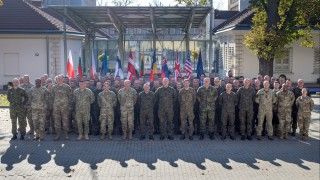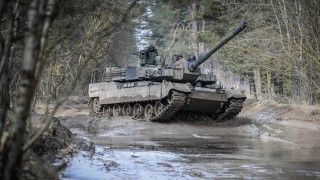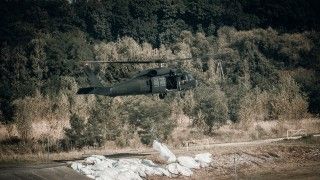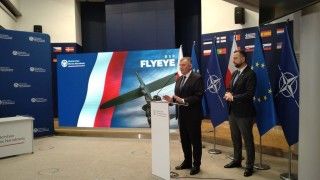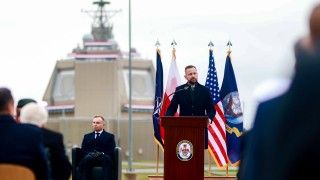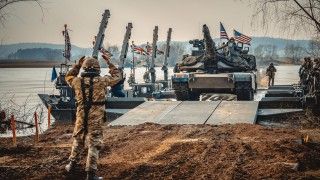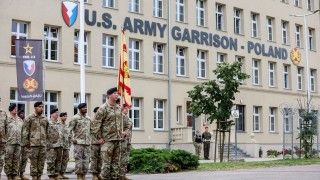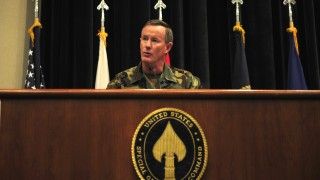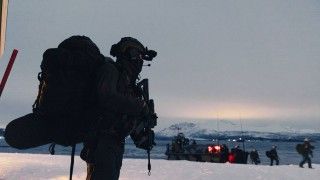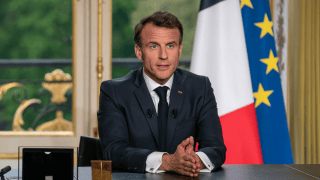- WYWIADY
- WIADOMOŚCI
Col. Jackson: The V Corps and 2 Polish Corps have one of the strongest relationships in NATO
Defence24 had the opportunity to interview Col. Kevin Jackson, Chief of Staff V Corps U.S. Army. The interview occurred during the 2nd Territorial Defense Forces Symposium, organized jointly by the V Corps and the 2nd Polish Corps. At the same time, talks were also held at the highest level of both Corps. Therefore, Colonel Jackson referred to territorial defense and building interoperability between the command structures of both national Corps. Jacek Raubo, head of the analysis division of Defence24, conducted the interview.
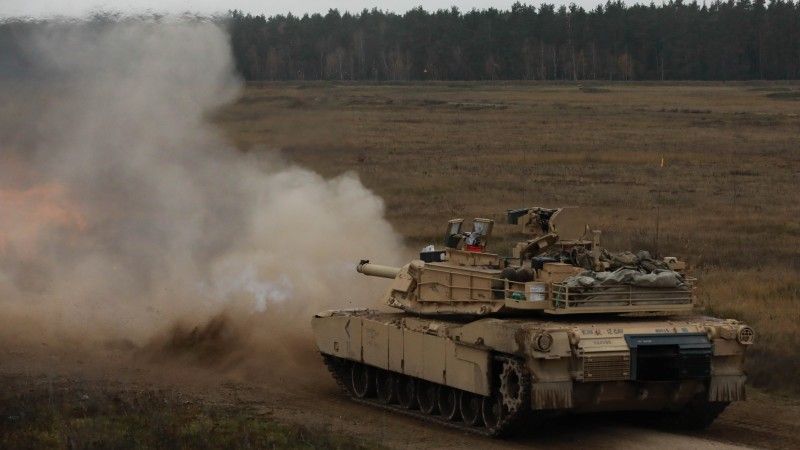
Photo. U.S. Army, Spc. Trevor Wilson
Jacek Raubo (Defence24) –Jacek Raubo (Defence24) – Colonel, thank you for this opportunity to talk with you in Kraków. So, I will start with the question, why is it so important, from the perspective of the deterrence and defense systems on NATO’s eastern flank, to analyze the territorial defense system in the countries of the region? How does the U.S. Army see the practical role of the TDFs on the Eastern Flank of NATO?
Col. Kevin Jackson, Chief of Staff V Corps U.S. Army - So I think we started this week. This is the V Corps« second Territorial Defense Forum, which is, and for this week it’s part of three operations, which we call Operation „Victory Sojusz Alliance”. So we understand how important the Territorial Defense Force is and part of the deterrence on the Eastern Flank. And so we were very pleased that several other nations were able to come and talk through some of their territorial defense plans. So that we can all better integrate and have an understanding of operations in case deterrence would fail.
Do you see any types or differences between the Territorial Defense Forces on the eastern flank or right now we can talk that we have the common ground when we think about TDF from the Baltic States to Poland.
I think over the last couple of days what I think that we’ve learned is just a better understanding as each of those Territorial Defense along with some of their state partnership programs from our National Guard. I think it helped us better understand from all the different countries« perspective, of how they integrate together and how we increase communication interoperability and the communication among all the Baltic states and other locations as well.
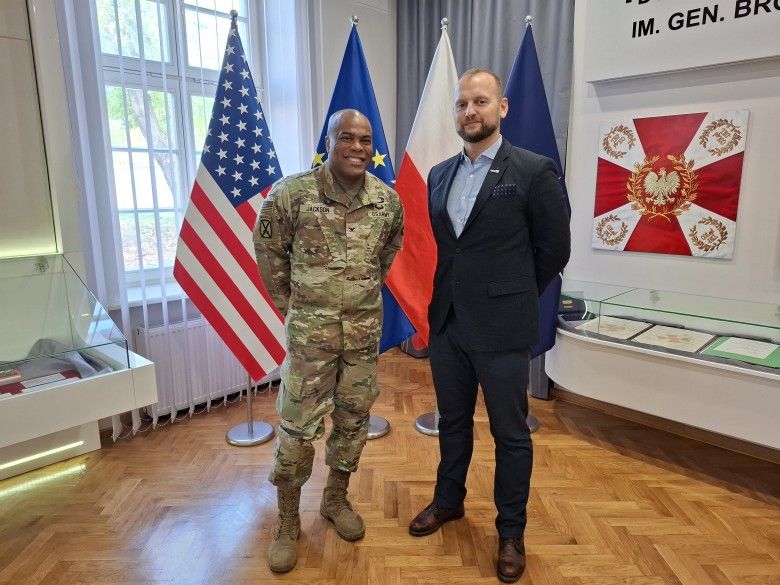
Colonel, when we think about the practical side of TDF when planning or building your plans for some threats here in this area, what kind of specific role of TDF do you see in this planning?
I think, for the V Corps is we want to understand what those national defense plans are. And so as we conduct our plan and we just see them as an integral portion of our operation and how that cooperation can strengthen defense across NATO and so for us it’s very critical to have that understanding because it impacts everything that we will do as part of our operation.
What is the role of cooperation between the V Corps, which is currently on Polish soil with the Polish Territorial Defense Forces? Can you say more about the practical side of this cooperation between the U.S. Army, V Corps, and Polish Territorial Defense Forces?
I think for the Polish Territorial Defense Forces, we continue to work with them as we conduct operations as part of our United States Army Europe and Africa, and with 2 Polish Corps. And so, that cooperation is increasing our understanding and our ability to plan on what potential operation outcomes can be in the future. I think the key piece is just really the understanding of the Territorial Defense Forces structure, their operations and how they can be a combat multiplier for both 2 Polish Corps, the Polish national interest and then also for V Corps, as we understand what they do better.
So now I would like to ask you specifically about the role of symposiums. We had one in Olsztyn and one right now in Kraków. Why are these kinds of symposiums important in long-term planning?
We think the symposiums are important. And so we conduct several symposiums across NATO. We think this one is so important because we wanted to continue to improve our understanding. And what we saw this time, as you highlighted earlier, is additional cooperation across the Baltic states. And so in the past, we didn’t have the breadth of all the nations briefing their territorial defense plan so we have a better understanding. And so what we were able to achieve over the last two days is that you know several nations along with, As I highlighted a little bit earlier, but they were along with their state partnership programs. They were able to talk to you about their challenges. They were also able to talk through their plans for the future and then they were able to provide shared understanding and potential ways that we can increase communication and interoperability across several nations that are on the flank.
I want to ask you about the lessons learned and sharing between American and Polish partners or TDF partners from the eastern flank. Can you emphasize some of these lessons learned you’d like to take with you and share them with your officers?
I think our biggest lesson learned is how critical the nation’s Territorial Defense Force is to any operation that would be conducted and how they would be a vital piece of our understanding and of any operation. And how we can rely on them to increase communication and to strengthen any deterrence in Europe.
Thank you, Sir, for these comments dedicated to TDF. Right now, I would like to focus on the second pillar and the cooperation between V Corps and 2 Polish Corps. How can we characterize the relationship between these national Corps? What is critical in this relationship in terms of developing the defense potential of the United States and Poland?
I think the V Corps and 2 Polish Corps is one of the strongest relationships in NATO. When you look at there’s two national corps, it’s U.S. V Corps and 2 Polish Corps. And so our cooperation together is absolutely essential to increase the warfighting capability here in Poland. And so I think we just value the relationship that we have with 2 Polish Corps and we’re trying to find ways to increase our interoperability, communication and future planning.
Colonel, what significant challenges have you diagnosed or seen for future actions?
I think across NATO and working with 2 Polish Corps and V Corps, we do want to increase our interoperability. Even, we know that there’s always challenges in interoperability, but one thing we want to do is continue to get repetitions together. And so we believe that as we increase our partnership, we’ll improve our ability to work and, if necessary, fight together through various exercises, planning. And then lessons learned from both organizations to make us better and better partners.
Can we already speak today about the unique relations between the two Corps?
So I think if you look in the past month or last month we conducted Operation Avenger Triad, an exercise with various NATO Corps and then 2 Polish Corps and U.S. V Corps. And I think this exercise highlighted our ability to operate together, to improve our communications across various warfighting functions and show that we have a credible force that’s only going to continue to get better as we get more repetitions and more exercises together.
What are the main challenges coming from Avenger Triad? In Poland, the general audience does not recognize the Avenger Triad. But I know that in armed forces structures, it’s something different. Therefore, I would like to talk because the Avenger Triad is everywhere in discussions between both Corps. In your discussion, even today, I have heard Avenger Triad topics and reflections many times. Why was Avenger Triad so important, and what challenges did you see during this exercise?
I think Avenger Triad is important because anytime that you can bring all the various Corps together to train, exercise interoperability, various communication systems and practice our ability to warfighting, that is just key to improving capacity for all the participants. And so I think Avenger Triad highlighted continued cooperation, particularly between V Corps and 2 Polish Corps. And it’s just a great opportunity to really exercise all the key functions that on a typical day-to-day basis you don’t get a chance to exercise.
Colonel, I want to discuss the Corps level right now. And I would like to ask you, do you see that we are dealing with a revolution of approach to the Corps level and warfighting on this level from the NATO side, from the American and Polish sides?
I would say yes, we’re focused on Corps and that’s why we’re here working with 2 Polish Corps, but we also know that it’s important to ensure that each level is trained. So the emphasis on brigades and divisions haven’t really gone away and that’s part of the training plans. So 2 Polish Corps and several of those other echelons will continue to train. But for us we know for the large-scale combat operations that the Corps is a significant piece of the fight. We want to make sure that both 2 Polish Corps and U.S. V Corps can be properly trained and then also provide whatever support is needed to those other echelons at the divisions and brigade levels as well.
Colonel, I heard many things about the interoperability between the Polish Army and the U.S. Army in some exercises. The people I spoke with underlined that synchronizing at the company platoon level is much easier. However, the brigade and above are the most significant problems and challenges. Do you agree that we are integrated with warfighting at the lower tactical level but must deal with interoperability more at the corps, division, and brigade levels?
Yeah, I think war fighting always has its challenges. And I think as a follow-up to your last question, so our third part of Operation Victory Sojusz is senior leader form. So we are bringing in the subordinate commanders at the division and brigade level as well. So they all interact with 2 Polish Corps, as well because of the importance of integrating, as you’ve highlighted, at every echelon. And so we’ll continue to get the repetitions and practices and exercises and both interoperability and communication. And so that’s why our commanders, having those commanders here with 2 Polish Corps over Thursday and Friday will be so critical to continue our ability to improve warfighting interoperability, communication and tactics from battalion, brigade on up. And so we’re looking forward to that over the next couple of days as the last part of this operation.
Colonel, If I may, I have one more question. When considering the interoperability between the corps from both armies, do you think the technological revolution is changing command posture?
As we know, every organization comes with its own challenges. And I think the biggest thing in Europe and probably all over the world would be that we continue to learn and be a learning army, both 2 Polish Corps and V Corps. We learn a lot of lessons learned from Ukraine and then we’ll continue to apply that to make sure that, you know, we’re continuing to learn as we move forward in our operations and exercises.
The last question I want to ask is about the future plans. I heard during the opening remarks that several new exercises and training are dedicated to this interoperability between the two Corps. Can you say more about the plans for the next year?
I think part of what we are continuing to do is we want to look at some of the lessons learned from Avenger Triad and our previous exercises that we’ve done together. And then what we’re going to brief both of our Commanding Generals is a way ahead. How do we continue to partner together to increase our interoperability and our ability to learn and fight together? And so one of the outcomes out of the second part of Operation Victory Sojusz is to present a plan and a roadmap for what are those training opportunities between the two Corps over the next 12 to 18 months.
Thank you, Colonel, for this interview.
Col. Jackson currently serves as the V Corps Chief of Staff subsequently after his successful campaign as the Brigade Commander of the 19th Battlefield Coordination Detachment at Ramstein Airbase, Germany. His previous assignments include: Afghanistan Country Director in the Office of the Secretary of Defense (Policy), Joint Staff Operations Officer (J35), Battalion Commander 2-15th Field Artillery Regiment, Officer Distribution Branch Chief HRC, Field Artillery Lieutenant Colonel Assignment Officer, Battalion Operations and Executive Officer for 1st Battalion, 377th Field Artillery Regiment and Brigade Operations Officer for 17th Fires Brigade, Fort Lewis, WA and various company grade level assignments. His operational deployments include multiple tours in support of Operation Iraqi Freedom (Iraq) (3), Operation Resolute Support (Afghanistan) and Operation Joint Guardian (Kosovo).













